- Worldometers, Tracker, nCov, TheWuhanVirus, TrackingProject, TestingProject, NYTimes (# ?s China & Iran)
- Johns Hopkins Map, News, Healthmap.org, Nextstrain, BBC, & Singapore
- CDC Summary, Updates, WHO Updates, & Scientists to Stop COVID-19 Intro exit
- SIR | c19-p, IHME, TX, NEUS, Columbia, LosAlomos (Model hub), OurWorld, Statistica, 91, info, VSL Calc, simulator
- The global races for Countermeasures (Operation Warp Speed)
(dexamethasone (Corticosteroids), Remdesivir (+ & +, -), Convalescent Plasma, Hydroxychloroquine poll, effectiveness & +, +, +, but also -, -, -, results). Vitamin D may be a factor (paper, hypothesis, deficiency in severe cases, & may suppress cytokine storm), and blood type may have an impact. The Lilly, Regeneron, 47D11, STI-1499 & Llama, monoclonal antibodies, RLF-100, Fenofibrate and Budesonide/Pulmicort may have potential.- Vaccine Candidates, Tracker, Visual (Cansino, Inovio, Moderna, Novavax, Oxford/Astrazeneca, Pfizer/BioNTech, Sinovac) ... but not everyone lining up.
My thoughts on Coronavirus
- This is a tragedy. Hundreds of thousands have passed away and our thoughts and prayers go out to those most impacted.
- Follow a healthy lifestyle (eat healthy food, stay hydrated, and exercise, preferably outside).
- If you are in a high risk group take extra precautions (see NY Data). Avoid taking health risks when the consequences are potentially so severe. Be smart and if you have been potentially exposed and don't compromise others. Wash your hands well and frequently and avoid touching your face, and wear a mask when close to others.
- Battling COVID is marathon, not a sprint, and we know we are getting better at fighting it over time. We know a lot about how it spreads, for instance weather and geographic location seem to affect the spread, but it generally spreads indoor (per studies in China & Japan), and travel through New York City (and the NYC subway) seeded much of the U.S. outbreak. Air flow and humidity seem to slow the spread. Women seem to defend against the virus better than men, children are less vulnerable, risks increase for those with hypertension, diabetes, cardiovascular diseases and respiratory system disease, and the throat Nose are keys.
- But much uncertainty remains going forward. Questions remain about the virus' origin. The US and Australian governments have theories, but no conclusion yet. Many argue that "SARS-CoV-2 is not a laboratory construct or a purposefully manipulated virus" perhaps with a long history. But Luc Montagnier (discovered HIV in 1983 and) believes it is a manipulated virus accidentally released from a laboratory in Wuhan. Shi Zhengli has said "it has nothing to do with our laboratory" but others argue the lab outbreak hypothesis makes more sense and the title of this 9/2020 article speaks for itself - " Unusual Features of the SARS-CoV-2 Genome Suggesting Sophisticated Laboratory Modification Rather Than Natural Evolution and Delineation of Its Probable Synthetic Route. Peter Forster argued the 1st transmission was likely between Sept & Dec, but not in Wuhan, which he believes got a mutated B strain. Nextstrain.org sees no evidence supporting the lab escape or genetically engineered theories (see also 4/30/2020 article). China's 1st case may have been 11/17/2019, it apparently was in France and Italy in 2019 (and Seattle?), in Florida in January, and the 1st death in the US may have been 2/6/2020 (early findings & modeling of spread).
- Determining the % of people that have antibodies is key, although many people may have partial T cell immunity from exposure to other coronaviruses. Michael Mina warned about trusting the numbers given flawed and inadequate testing. Some believe the number of deaths are under-reported, while others believe they are over-reported. Youyang Gu encourages a neutral perspective - “Watch out for selection bias, which is when you gravitate towards data that matches your belief and you ignore data that goes against your belief”. Estimating the number of total infection has improved, but remains suspect. Serological surveys have consistently found that far more people have been exposed to the coronavirus, suggesting the risks and infection fatality rates are much lower than initial case fatality rate estimates. Some prisons have reported a majority testing positive (Marion Correctional in Ohio & Cummins in Arkansas) & a shelter in San Francisco). Other antibody/COVID samples include ?92% Iquitos, Peru, ~57% Mumbai Slums, ~42% Ischgl Austria, ~32% Chelsea Mass., ~27% NY City (~21% prior & ~14% NY State & ~15% NYC pregnant women), ~26% France, ~22% Iran, ~20% USS Theodore Roosevelt, ~19% Diamond Princess, ~17% London (>5% UK), ~15% Gangelt Germany, ~13% North Carolina (prior), ~10% Wuhan, ~9.7% Geneva (prior), ~7.3% Stockholm, ~6% UK, ~6% Miami, ~5% Spain, ~4% Los Angeles, ~3.5% Arizona, ~3% Connecticut, ~3% Santa Clara (Vo Italy beat the coronavirus by testing everyone, when 3% had it), ~3% Kobe, ~2.8% Indiana, ~2.7% Netherlands, ~2.5% Israel, ~1.8% Idaho, ~1.7% Denmark, ~1% Scotland (& Col) <1% Brazil. While Sweden's strategy is hotly debated, keep in mind Belgium is probably over reporting deaths and Iceland has good data, but those making assumptions based on "confirmed" cases are often underestimating actual exposure based on the above data. Justin Fox summarized IFR data(4/24/2020) (& NY), while John Ioannidis summarized (5/19/2020) "Infection fatality rates ranged from 0.03% to 0.50% and corrected values ranged from 0.02% to 0.40%" and 7/14 update estimated 0.27%. Ovik Roy has an interesting risk comparison to the flu (see graphic below).
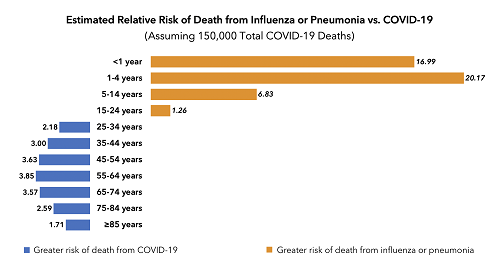

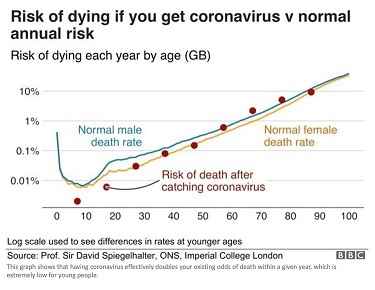
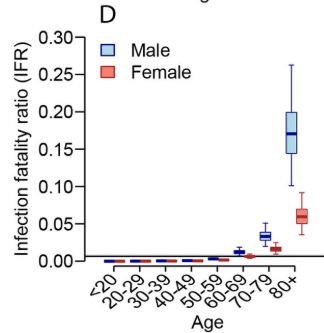

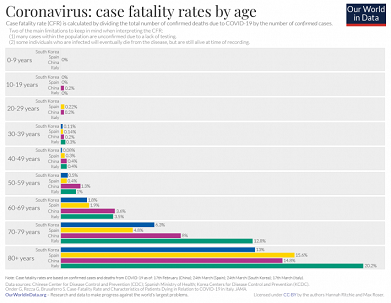

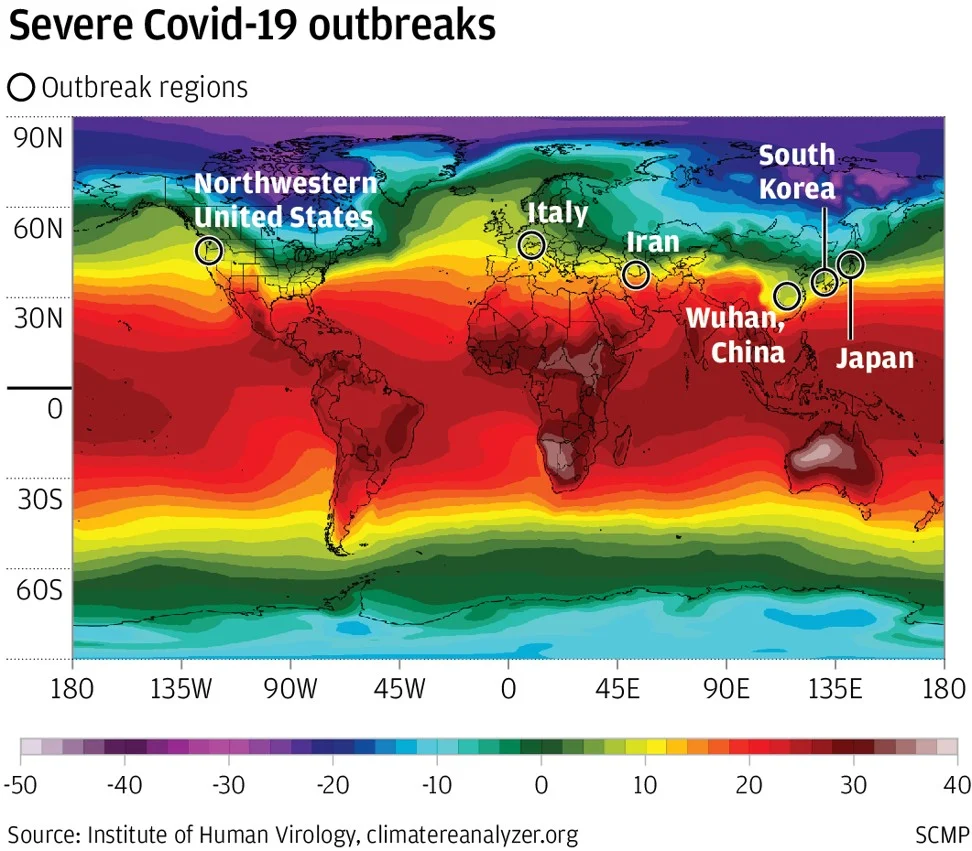
Regarding Investing
- Have an investment plan (aka an Investment Policy Statement). According to a 2019 Charles Schwab survey, only an estimated 28% of Americans have a written financial plan (but the 63% of those that have a plan feel financially stable).
- If your risk tolerance has changed, you may want to re-evaluate and adjust accordingly.
- If you believe in rebalancing when values of your primary asset classes drop a certain percentage (say 10-20%), or asset allocation percentages break predetermined ranges, and you haven't done anything, you are missing the point. For the record, I starting buying very modest amounts of stocks for myself and others on February 28 and continued buying into mid March (and believe it or not, I bought stocks [the Fidelity Total US Market Index Fund] on 3/6/2009 which was the stock market bottom of the GFC).
- Historically, these types of corrections turn out to be good times to invest because in the long run, governments respond globally, uncertainty diminishes, and markets recover and go higher. There are a lot of experienced investors sitting on a lot of cash (or dry powder) waiting for opportunities to invest at better values, and now there are a lot of bargains.
Who warned in advance? George Bush 11/1/2005 & Bill Gates 4/3/2015 (& this event)

Investing related commentary
- Why the Coming COVID-19 Mortgage Crisis May Be Worse Than the Last One by William Cohan (4/10/2020)
- This Isn’t the Next Great Depression by Cullen Roche (04/08/2020)
- Michael Burry was one of the biggest GFC winners and disagrees with the government shutdown (4/7/2020)
- Why U.S. Housing Bubble 2.0 Is About To Burst Jesse Colombo (3/31/2020) (a pessimistic perspective)
- “Courage! We have been here before” from Capital Group (an optimistic perspective)
- Comparing stocks returns in pandemics (3/25/2020) | Stock markets during previous pandemics? (Fidelity circa 2006?) via J. Michael Steele
- What would Jack Bogle do? by Allan Roth (3/18/2020)
- Coronavirus Likely to Be Mild Pandemic With Minimal Long-Term Economic Effect by Karen Andersen and Preston Caldwell at Morningstar (3/10/20120)
- Rick Ferri on making lemonade out of lemons via Forbes (3/9/2020)
- Allan Roth on volatility via FinancialPlanning.com (3/9/2020)
- Marcus and Millichap on impact on Commercial Real Estate
- Coronavirus going to hit its peak and start falling sooner than you think from Michael Fumento (3/8/2020) (an optimistic perspective)
- Nouriel Roubini expects global equities to tank by 30-40% (3/1/2020) (a pessimistic perspective)
- What Happens to Stocks After a Big Down Month? by Ben Carlson (3/1/2020)
- David Graham, MD "I’m not worried about the long-term effect of the Coronavirus on the Stock Market ... My prediction—80% chance this will be nothing more than the common cold for most investors ... Folks with pre-existing conditions—that is those who panic and sell low—will have some long term affects." (3/1/2020)
- Imagine the coronavirus caused the U.S. economy to shrink 4% Jonathan Clements (2/24/2020)
- We’re Reading the Coronavirus Numbers Wrong by John Allen Paulos (2/18/2020)
"the practice of elevating the famous to presumed expert status was a long and checkered practice ... The pandemic has exacerbated a more general problem of confirmation bias, or seeking evidence to validate a preconceived notion ... The cable networks, in particular, troll for pseudo-experts – some credentialed, some not – who express viewpoints that reflect the biases of the network and/or interviewer” source (4/18/2020)
"Dealing with hardship actually makes you stronger ... America is America because we overcome adversity and challenges ... We are going to overcome this and America will be the greater for it."
Andrew Quomo (3/22/2020)
Independence Day Movie Clips
We can't be consumed by our petty differences anymore.
We will be united in our common interests ...
We are fighting for our right to live, to exist ...

...the Americans. They want to organize a counteroffensive. Its about bloody time.
Gary Karz, CFA
Author of The Peaceful Investor and Publisher of InvestorHome.com
twitter.com/GKarz (email)
Check out Peaceful Investor at Amazon